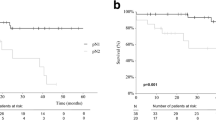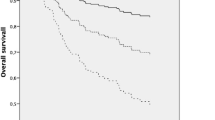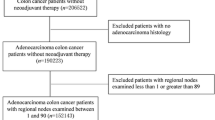Abstract
Background
Though lymph node status may predict long-term outcome of patients with non-metastatic colon cancer, discordant findings exist among various expressions of lymph node status. The present study was designed to assess the prognostic value among these lymph node evaluations.
Methods
The analysis was based on surgical patients with newly diagnosed colon adenocarcinoma registered in the Taiwan Cancer Database from 2003 to 2005. Exclusion criteria included those patients who had stage IV disease, those whose survival period was <1 month, or those whose lymph node information was unavailable. Studied variables included total number of lymph nodes (LNT), number of positive lymph nodes (LNP), number of negative lymph nodes (LNN), ratio of positive lymph nodes (LNR), and log odds of positive lymph nodes (LODDS).
Results
Of 16,790 newly diagnosed colon cancer patients, there were 9,644 (65.4 ± 13.5 years; male 54.9 %) patients with non-metastatic disease who met the criteria. Correlation analyses for patients with stage III disease showed that LNR and LODDS were highly correlated, as were LNT and LNN. By the Cox proportional hazard model, LNT was prognostic of long-term survival in patients with stage II disease, while LNR and LNP were the most powerful prognosticators for patients with stage III disease (p < 0.001). Both the receiver operating characteristics curve analysis and area under the curve indicated that LNR had the best discriminating capability to predict 5-year survival (0.704, 0.700, and 0.709 for overall, disease-free, and disease-specific survival, respectively), followed by LODDS.
Conclusions
For patients undergoing resection for colon cancer, LNR, LODDS, and LNP are better prognostic factors for those with stage III disease than LNT is for patients with stage III disease.


Similar content being viewed by others
References
Namm J, Ng M, Roy-Chowdhury S et al (2008) Quantitating the impact of stage migration on staging accuracy in colorectal cancer. J Am Coll Surg 207:882–887
Rosenberg R, Engel J, Bruns C et al (2010) The prognostic value of lymph node ratio in a population-based collective of colorectal cancer patients. Ann Surg 251:1070–1078
Dillman RO, Aaron K, Heinemann FS et al (2009) Identification of 12 or more lymph nodes in resected colon cancer specimens as an indicator of quality performance. Cancer 115:1840–1848
Johnson PM, Porter GA, Ricciardi R et al (2006) Increasing negative lymph node count is independently associated with improved long-term survival in stage IIIB and IIIC colon cancer. J Clin Oncol 24:3570–3575
Ceelen W, Van Nieuwenhove Y, Pattyn P (2010) Prognostic value of the lymph node ratio in stage III colorectal cancer: a systematic review. Ann Surg Oncol 17:2847–2855
Desch CE, McNiff KK, Schneider EC et al (2008) American Society of Clinical Oncology/National Comprehensive Cancer Network quality measures. J Clin Oncol 26:3631–3637
Kukreja SS, Esteban-Agusti E, Velasco JM et al (2009) Increased lymph node evaluation with colorectal cancer resection: does it improve detection of stage III disease? Arch Surg 144:612–616
Bilimoria KY, Bentrem DJ, Stewart AK et al (2008) Lymph node evaluation as a colon cancer quality measure: a national hospital report card. J Natl Cancer Inst 100:1310–1317
Derwinger K, Carlsson G, Gustavsson B (2007) Stage migration in colorectal cancer related to improved lymph node assessment. Eur J Surg Oncol 33:849–853
Wang JP, Kulaylat M, Rockette H et al (2009) Should total number of lymph nodes be used as a quality of care measure for stage III colon cancer? Ann Surg 249:559–563
Moug SJ, Saldanha JD, McGregor JR et al (2009) Positive lymph node retrieval ratio optimises patient staging in colorectal cancer. Br J Cancer 100:1530–1533
Schumacher P, Dineen S, Barnett C et al (2007) The metastatic lymph node ratio predicts survival in colon cancer. Am J Surg 194:827–832
Kim YS, Kim JH, Yoon SM et al (2009) Lymph node ratio as a prognostic factor in patients with stage III rectal cancer treated with total mesorectal excision followed by chemoradiotherapy. Int J Radiat Oncol Biol Phys 74:796–802
Stocchi L, Nelson H, Sargent DJ et al (2001) Impact of surgical and pathologic variables in rectal cancer: a United States community and cooperative group report. J Clin Oncol 19:3895–3902
Vather R, Sammour T, Kahokehr A et al (2009) Lymph node evaluation and long-term survival in stage II and stage III colon cancer: a national study. Ann Surg Oncol 16:585–593
Berger AC, Sigurdson ER, LeVoyer T et al (2005) Colon cancer survival is associated with decreasing ratio of metastatic to examined lymph nodes. J Clin Oncol 23:8706–8712
Wang JP, Hassett JM, Dayton MT et al (2008) The prognostic superiority of log odds of positive lymph nodes in stage III colon cancer. J Gastrointest Surg 12:1790–1796
Hashiguchi Y, Hase K, Ueno H et al (2010) Prognostic significance of the number of lymph nodes examined in colon cancer surgery: clinical application beyond simple measurement. Ann Surg 251:872–881
Peeples C, Shellnut J, Wasvary H et al (2010) Predictive factors affecting survival in stage II colorectal cancer: is lymph node harvesting relevant? Dis Colon Rectum 53:1517–1523
Downing SR, Cadogan KA, Ortega G et al (2010) The number of lymph nodes examined debate in colon cancer: how much is enough? J Surg Res 163:264–269
Chung KP, Chang YJ, Lai MS et al (2010) Is quality of colorectal cancer care good enough? Core measures development and its application for comparing hospitals in Taiwan. BMC Health Serv Res 10:27
Tsikitis VL, Larson DL, Wolff BG et al (2009) Survival in stage III colon cancer is independent of the total number of lymph nodes retrieved. J Am Coll Surg 208:42–47
Choi HK, Law WL, Poon JT (2010) The optimal number of lymph nodes examined in stage II colorectal cancer and its impact of on outcomes. BMC Cancer 10:267
Wang JP, Hassett JM, Dayton MT et al (2008) Lymph node ratio: role in the staging of node-positive colon cancer. Ann Surg Oncol 15:1600–1608
Yildirim E, Berberoglu U (2007) Lymph node ratio is more valuable than level III involvement for prediction of outcome in node-positive breast carcinoma patients. World J Surg 31:276–289. doi:10.1007/s00268-006-0487-5
Vinh-Hung V, Verschraegen C, Promish DI et al (2004) Ratios of involved nodes in early breast cancer. Breast Cancer Res 6:R680–R688
Ishihara R, Yamada T, Iishi H et al (2009) Quantitative analysis of the color change after iodine staining for diagnosing esophageal high-grade intraepithelial neoplasia and invasive cancer. Gastrointest Endosc 69:213–218
Galizia G, Orditura M, Ferraraccio F et al (2009) The lymph node ratio is a powerful prognostic factor of node-positive colon cancers undergoing potentially curative surgery. World J Surg 33:2704–2713. doi:10.1007/s00268-009-0207-z
Author information
Authors and Affiliations
Corresponding author
Electronic supplementary material
Below is the link to the electronic supplementary material.
Rights and permissions
About this article
Cite this article
Chang, YJ., Chang, YJ., Chen, LJ. et al. Evaluation of Lymph Nodes in Patients with Colon Cancer Undergoing Colon Resection: A Population-based Study. World J Surg 36, 1906–1914 (2012). https://doi.org/10.1007/s00268-012-1568-2
Published:
Issue Date:
DOI: https://doi.org/10.1007/s00268-012-1568-2




